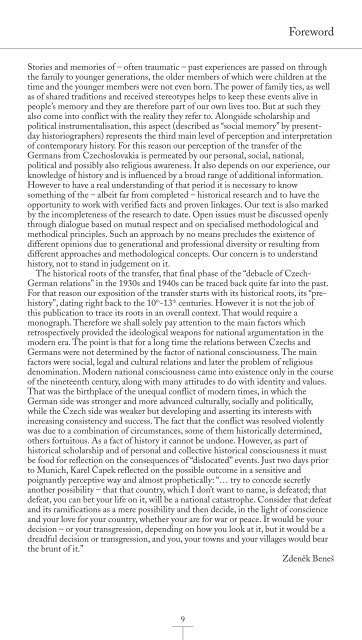the nationality of all inhabitants of the czech provinces and ...
the nationality of all inhabitants of the czech provinces and ...
the nationality of all inhabitants of the czech provinces and ...
You also want an ePaper? Increase the reach of your titles
YUMPU automatically turns print PDFs into web optimized ePapers that Google loves.
Foreword<br />
Stories <strong>and</strong> memories <strong>of</strong> – <strong>of</strong>ten traumatic – past experiences are passed on through<br />
<strong>the</strong> family to younger generations, <strong>the</strong> older members <strong>of</strong> which were children at <strong>the</strong><br />
time <strong>and</strong> <strong>the</strong> younger members were not even born. The power <strong>of</strong> family ties, as well<br />
as <strong>of</strong> shared traditions <strong>and</strong> received stereotypes helps to keep <strong>the</strong>se events alive in<br />
people’s memory <strong>and</strong> <strong>the</strong>y are <strong>the</strong>refore part <strong>of</strong> our own lives too. But at such <strong>the</strong>y<br />
also come into conflict with <strong>the</strong> reality <strong>the</strong>y refer to. Alongside scholarship <strong>and</strong><br />
political instrumentalisation, this aspect (described as “social memory” by presentday<br />
historiographers) represents <strong>the</strong> third main level <strong>of</strong> perception <strong>and</strong> interpretation<br />
<strong>of</strong> contemporary history. For this reason our perception <strong>of</strong> <strong>the</strong> transfer <strong>of</strong> <strong>the</strong><br />
Germans from Czechoslovakia is permeated by our personal, social, national,<br />
political <strong>and</strong> possibly also religious awareness. It also depends on our experience, our<br />
knowledge <strong>of</strong> history <strong>and</strong> is influenced by a broad range <strong>of</strong> additional information.<br />
However to have a real underst<strong>and</strong>ing <strong>of</strong> that period it is necessary to know<br />
something <strong>of</strong> <strong>the</strong> – albeit far from completed – historical research <strong>and</strong> to have <strong>the</strong><br />
opportunity to work with verified facts <strong>and</strong> proven linkages. Our text is also marked<br />
by <strong>the</strong> incompleteness <strong>of</strong> <strong>the</strong> research to date. Open issues must be discussed openly<br />
through dialogue based on mutual respect <strong>and</strong> on specialised methodological <strong>and</strong><br />
methodical principles. Such an approach by no means precludes <strong>the</strong> existence <strong>of</strong><br />
different opinions due to generational <strong>and</strong> pr<strong>of</strong>essional diversity or resulting from<br />
different approaches <strong>and</strong> methodological concepts. Our concern is to underst<strong>and</strong><br />
history, not to st<strong>and</strong> in judgement on it.<br />
The historical roots <strong>of</strong> <strong>the</strong> transfer, that final phase <strong>of</strong> <strong>the</strong> “debacle <strong>of</strong> Czech-<br />
German relations” in <strong>the</strong> 1930s <strong>and</strong> 1940s can be traced back quite far into <strong>the</strong> past.<br />
For that reason our exposition <strong>of</strong> <strong>the</strong> transfer starts with its historical roots, its “prehistory”,<br />
dating right back to <strong>the</strong> 10 th -13 th centuries. However it is not <strong>the</strong> job <strong>of</strong><br />
this publication to trace its roots in an over<strong>all</strong> context. That would require a<br />
monograph. Therefore we sh<strong>all</strong> solely pay attention to <strong>the</strong> main factors which<br />
retrospectively provided <strong>the</strong> ideological weapons for national argumentation in <strong>the</strong><br />
modern era. The point is that for a long time <strong>the</strong> relations between Czechs <strong>and</strong><br />
Germans were not determined by <strong>the</strong> factor <strong>of</strong> national consciousness. The main<br />
factors were social, legal <strong>and</strong> cultural relations <strong>and</strong> later <strong>the</strong> problem <strong>of</strong> religious<br />
denomination. Modern national consciousness came into existence only in <strong>the</strong> course<br />
<strong>of</strong> <strong>the</strong> nineteenth century, along with many attitudes to do with identity <strong>and</strong> values.<br />
That was <strong>the</strong> birthplace <strong>of</strong> <strong>the</strong> unequal conflict <strong>of</strong> modern times, in which <strong>the</strong><br />
German side was stronger <strong>and</strong> more advanced cultur<strong>all</strong>y, soci<strong>all</strong>y <strong>and</strong> politic<strong>all</strong>y,<br />
while <strong>the</strong> Czech side was weaker but developing <strong>and</strong> asserting its interests with<br />
increasing consistency <strong>and</strong> success. The fact that <strong>the</strong> conflict was resolved violently<br />
was due to a combination <strong>of</strong> circumstances, some <strong>of</strong> <strong>the</strong>m historic<strong>all</strong>y determined,<br />
o<strong>the</strong>rs fortuitous. As a fact <strong>of</strong> history it cannot be undone. However, as part <strong>of</strong><br />
historical scholarship <strong>and</strong> <strong>of</strong> personal <strong>and</strong> collective historical consciousness it must<br />
be food for reflection on <strong>the</strong> consequences <strong>of</strong> “dislocated” events. Just two days prior<br />
to Munich, Karel Čapek reflected on <strong>the</strong> possible outcome in a sensitive <strong>and</strong><br />
poignantly perceptive way <strong>and</strong> almost prophetic<strong>all</strong>y: “… try to concede secretly<br />
ano<strong>the</strong>r possibility – that that country, which I don’t want to name, is defeated; that<br />
defeat, you can bet your life on it, will be a national catastrophe. Consider that defeat<br />
<strong>and</strong> its ramifications as a mere possibility <strong>and</strong> <strong>the</strong>n decide, in <strong>the</strong> light <strong>of</strong> conscience<br />
<strong>and</strong> your love for your country, whe<strong>the</strong>r your are for war or peace. It would be your<br />
decision – or your transgression, depending on how you look at it, but it would be a<br />
dreadful decision or transgression, <strong>and</strong> you, your towns <strong>and</strong> your villages would bear<br />
<strong>the</strong> brunt <strong>of</strong> it.”<br />
Zdeněk Beneš<br />
9


